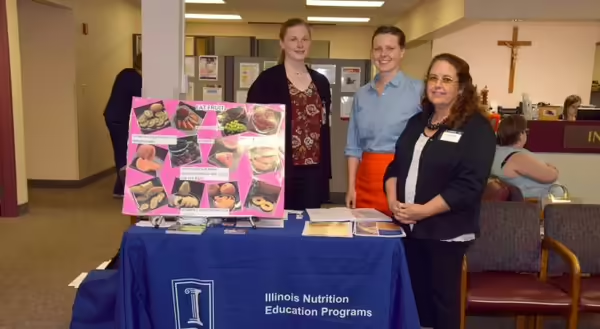
With a priority of focusing on food as medicine, University of Illinois Extension staff teamed up with two partners to provide Heartland Health Services pediatric families a bundle of fresh produce in conjunction with nutrition education and resources as part of a 10 week pilot project. Extension staff involved are part of the Supplemental Nutrition Assistance Program—Education (SNAP-Ed) effort serving Fulton, Mason, Peoria, and Tazewell counties. The two partners were University of Illinois College of Medicine at Peoria (UICOMP) and Peoria Area Food Bank.
The pilot project was designed to focus on families who are considered food insecure—i.e. those not having consistent access to enough nutritious food for an active, healthy, life. Research has shown that communities with higher rates of food insecurity have higher rates of diet related chronic diseases when compared to national rates. In fact, 66% of pantry households indicate they choose between buying food or paying for medical needs.
Peoria Area Food Bank allocated funds to procure fresh, Illinois, seasonal produce. SNAP-Ed staff provided assistance in selecting the produce offered while keeping cost, seasonality, storage, and preparation in mind.
SNAP-Ed staff also provided nutrition education to compliment the seasonal produce provided each week. Taste tests were conducted in the waiting area using Eat. Move. Save. recipes. Community resources and recipe cards were also distributed. The nutrition education informed families how to eat healthy on a budget, in addition to why and how what you eat impacts your health.
This community collaboration provided a research opportunity for UICOMP students. Students surveyed patients on their family’s “food situation” to better understand patient care.
This pilot project is an example of programs and partnerships executed by our SNAP-Ed team to address food insecurity in a tiered approach. This approach helps people directly, helps other agencies serving the people, and helps improve over-arching systems and policies used in our geographic area. With the child food insecurity in Fulton, Mason, Peoria and Tazewell counties ranging from 14.6%-18.9%, improving the quality of food consumed is a focus for SNAP-Ed programming.
MEET THE AUTHOR
As a SNAP-Education Extension Educator through Illinois Nutrition Education Programs (INEP) serving Fulton, Mason, Peoria and Tazewell counties, Kaitlyn Streitmatter provides evidence-based nutrition and physical activity education to low resource families in a variety of community settings. SNAP-Ed evidenced-based programs focus on nutrition education and obesity prevention through promoting behavior change. Kaitlyn works to provide professional development opportunities and hand-on assistance with policy and system change. Kaitlyn works in collaboration with local partners such as food pantries, schools, child care programs and other community agencies in an effort to build healthier communities.
Kaitlyn received her Bachelor of Science degree in Community Health from University of Illinois. Following her undergraduate degree Kaitlyn earner a Master’s of Science degree in Kinesiology at Southern Illinois, Edwardsville and a Graduate Certificate in Community Health Education from the University of Illinois. Kaitlyn is also a Certified Health Education Specialist.
ABOUT EXTENSION SNAPSHOTS
Extension Snapshots are monthly impact reports that share the stories of our programs in Fulton, Mason, Peoria, and Tazewell counties. To have them delivered to you directly sign up using our E-blast registration.